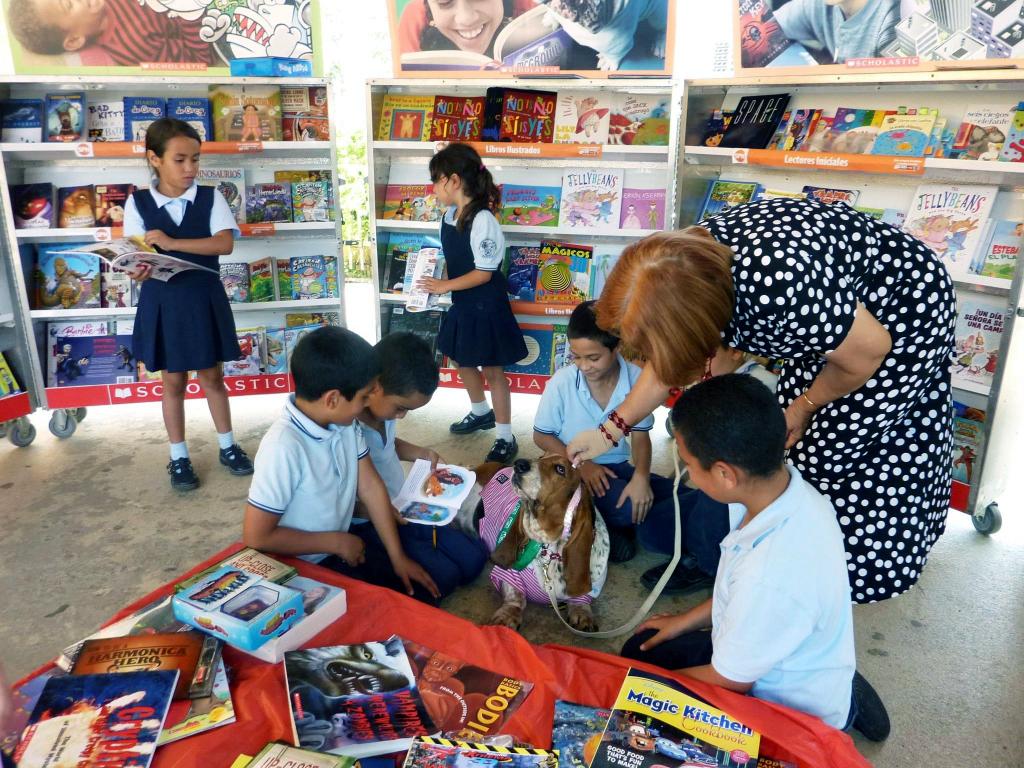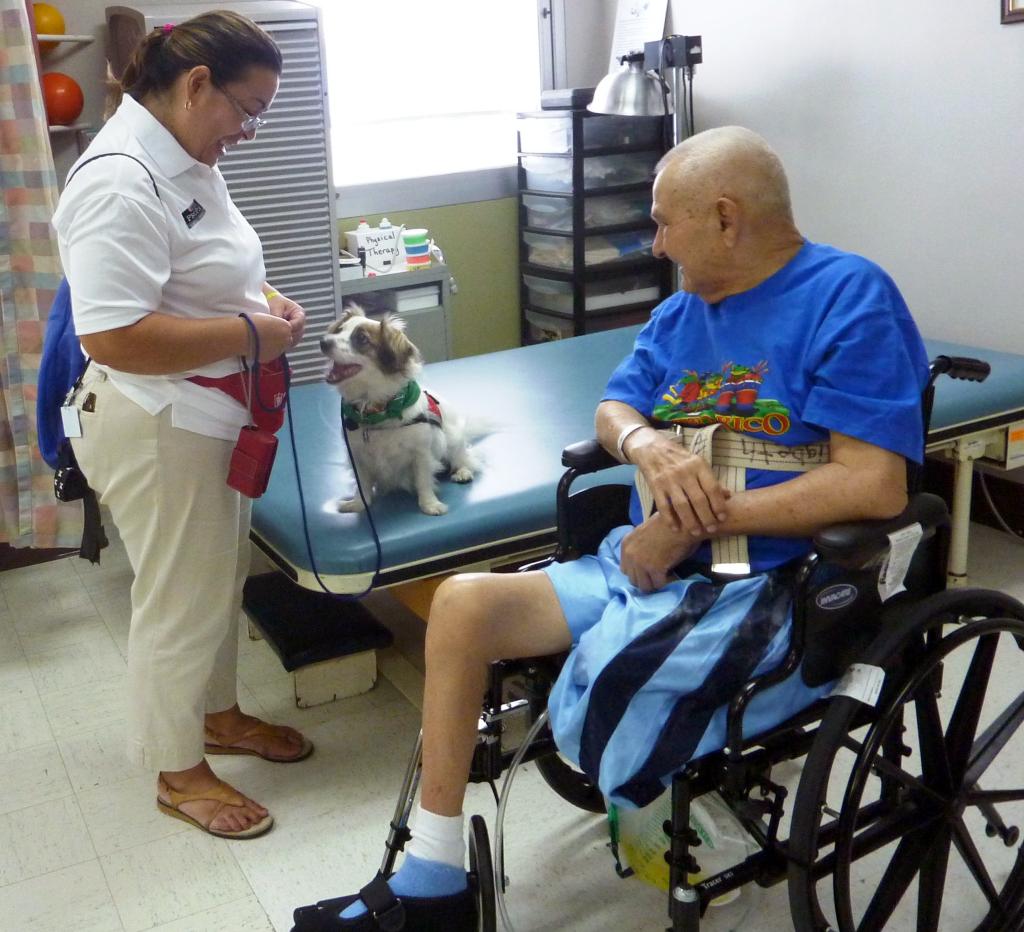She looked deep into his eyes and what she found there was a world of love and infinite
goodness. He looked back at her with a promise of unconditional loyalty. You might
think we’re talking about the latest romantic film, but actually this emotive scene
was acted out between a lady and a dog, no less. Well actually there were various
people who met up recently to enjoy the many benefits of the Federación Canófila
de Puerto Rico’s Canine Therapy Programme.
What it means is that a large group of volunteers – all dog owners – meet up from
time to time to bring smiles to the faces of hundreds of patients at many hospitals
and health centres across the whole of the Island and at the same time keeping them
company.
© Marie Nevarez, Director of the FCPR’s Canine Therapy Programme


FCPR
The project was such a hit that the Federación Canófila - with the backing of the
Fédération Cynologique Internationale – sought to introduce the Canine Therapy Programme
to all of the country’s hospitals and centres for the elderly. In order to achieve
this, the FCPR offered the services of therapy dogs to all of the country’s municipal
governments.
As a result, canine therapy services started to become available in various places,
with unprecedented success. Rafael de Santiago, Chairman of the Federación Canófila
de Puerto Rico, pointed out that this programme is one of the ways in which the
FCPR fulfils its social responsibilities.
It’s also fantastic fun!
A few of the elderly people involved told us what they thought about the visits
by the Federación Canófila de Puerto Rico’s canine therapy dogs.
Ana Sylvia Colón: “I thought it was fantastic, absolutely lovely. We used to have
dogs at home and my husband even made a grave for the last one we had and who died
of old age. When the dogs came to visit us I felt happy and really calm”.
Viergenmina Rodríguez: “I really like it when they come. The thing with the dogs
is really good. I felt great because (at home) I’ve got four (dogs), ranging from
Chihuahuas to Labradors. It’d also be great if they went to visit sick children
because it stimulates the kids”.
Pascual Rivera Rodríguez: “I thought it was great that they were bringing us something
we’d never seen before. When you see them (the dogs) for the first time (it) has
a real impact. I really like dogs, but I don’t have any of my own and I was really
happy. I think they ought to extend this programme (to other centres)”.
Ramonita Morales: “I love Collies and all dogs with long noses. I thought (the dogs’
visit) was a really good idea and I’d like to see them do it again - of course I
would”.
Myrta Cordoba: “I thought it was fantastic. It’s something I’ve seen on television
and I think it’s wonderful. I think it’s a really good idea, especially for children,
and it’s also a bit of entertainment for older people”.
Miguel Rodríguez: “It was brilliant. Everyone here was really happy, we had quite
a party! The dogs would come over to you and say hello. I felt safe because the
dogs are well trained and obey orders. I think it’s something that ought to be extended”.
More about therapy dogs in Puerto Rico
According to Miguel Casellas-Gil, of the Federación Canófila de Puerto Rico: “The
idea was based on the fact that, as the saying goes, dogs are man’s best friend.
So, working in partnership with Purina Pro Plan, we’ve developed alternating programmes,
using therapy dogs”.
© Marie Nevarez, Director of the FCPR’s Canine Therapy Programme


FCPR
The programmes include:
- Paws for Reading – This is a programme for schools using dogs to stimulate reading
among children with learning and reading problems. As dogs neither judge nor criticise,
the children lose their fear of getting things wrong.
- Centres for the elderly – In order to cheer them up and offer some friendly company,
regular visits to elderly people, who may not be able to have pets or have lost
their own, are coordinated for their amusement and recreation.
- Programmes for young people who drop out of school. The dogs entertain and stimulate
students, as well as offering them emotional support during workshops specifically
designed to try and prevent children from dropping out of school.
Did you know...?
According to the
www.webmd.com
portal, pets can help to reduce our blood pressure and anxiety levels. If that were
not enough, many studies have found that owning or interacting with a pet improves
our immune systems.
Your dog might make a good candidate!
The Federación Canófila de Puerto Rico (FCPR) assesses, selects and certifies dogs
which have the ability to work as therapy animals. Both purebred and crossbred dogs
can be registered, as long as they meet the essential requirements.
How are the pets certified?
There are specialist members of staff whose job it is to certify the dogs, which
undergo stringent testing, including a basic obedience course to guarantee the safety
of all patients. If that were not enough, each patient is covered by a liability
insurance policy taken out by the FCPR.
What specific health areas are covered by these services?
There are improvements to the motor skills of the various parts of the body.
All of the comprehensible forms of communication – such as language - are stimulated,
helping to increase vocabulary and improving human interaction.
Cognitive and educational skills are developed, helping with the recognition of
concepts such as size, colour, shape, location, etc. There are also improvements
to short and long-term memory.
There is a rise in self-esteem and social and emotional feelings are developed.
Patients often feel more like taking part in group activities.
© Marie Nevarez, Director of the FCPR’s Canine Therapy Programme


FCPR
Requirements in order to become an FCPR therapy dog:
- The registration form must be completed.
- The animal must pass the eleven compulsory tests.
- The dog must be at least one year old.
- If the dog’s owner is aged under 18, all visits must be made accompanied by an adult.
- The dog must be up-to-date with all of its vaccinations and the owner must produce
evidence of these.
- A certificate issued by a licensed vet must be produced ensuring that the dog is
not suffering from any illnesses.
- Two 2'' x 2'' photographs of the dog must be submitted.
- The dog must be registered with the FCPR.
The FCPR reserves the right of admission.
Upon registration, owner and dog will receive the following:
- ID with a photo for the dog, registration number and address (valid for one year)
- ID for the dog’s owner or handler (valid for one year)
- A polo shirt with the FCPR emblem, the emblem of the sponsoring company and a bandana
for the dog
Adela Dávila Estelritz